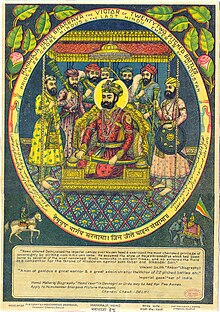Second Battle of Panipat
Humayun made use of this discord to recapture what was lost and on 23 July 1555, the Mughals defeated Sikandar Shah Suri and finally regained control over Delhi and Agra.
[4] Hemu started a rapid march from Bengal and drove the Mughals out of Bayana, Etawah, Bharthana, Bidhuna, Lakhna, Sambhal, Kalpi, and Narnaul.
[4] He took possession of Delhi after a day's battle on 7 October 1556[5] and claimed royal status assuming the title of Vikramaditya (or Bikramjit).
In a stroke of luck, Ali Quli Khan Shaibani (later Khan-i-Zaman), who had been sent ahead with a 10,000-strong cavalry force, chanced upon Hemu's artillery, which was being transported under a weak guard.
[1] Hemu's army was numerically superior, counting among its ranks a 30,000-strong cavalry force consisting of Afghan horse riders and an elephant contingent numbering 500.
Those soldiers who were able to escape the rampage, rather than retreating, chose to veer to the sides and attack the flanks of Hemu's cavalry, pelting them with their superior archery.
Neither Hemu's elephant nor his horse units were able to cross the chasm to reach their opponents and were vulnerable to the projectile weapons being fired from the other side.
Meanwhile, the Mughal cavalry, on their swift mounts, had made inroads into the Afghan ranks from the flanks and the rear and began targeting the elephants, either slashing at the legs of the great beasts or taking out their riders.
Even after seeing Shadi Khan Kakkar and another of his able lieutenants, Bhagwan Das, go down, he continued to lead counterattacks against the Mughals, running down any who challenged his elephants.
[14] Both the wings of the Mughal army had been driven back, and Hemu moved his contingent of war elephants and cavalry forward to crush their centre.
It was at this point that Hemu, possibly on the cusp of victory, was wounded when he was struck in the eye by a chance Mughal arrow and collapsed unconscious.
However, this is not attested by contemporary writer Muhammad Arif Qandhari (composed Tarikh e Akbari), who mentioned that Akbar followed Bairam Khan's advice and himself beheaded Hemu and took the title of Ghazi.
[16][22] The spoils from the battle at Panipat included 120 of Hemu's war elephants, whose destructive rampages so impressed the Mughals that the animals soon became an integral part of their military strategies.
